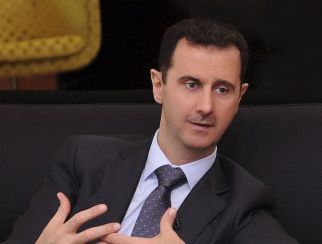Arab League foreign ministers have called Syrian President Bashar al-Assad to step down, as rebels are encouraged by last week’s assassinations in Damascus.
The rebels said the deaths of four top officials were a severe blow to the government.
Islamist rebels where he is are receiving weapons and money from outside.
Fighting continued overnight.
Government forces recaptured parts of Damascus, the suburbs of Barzeh and Mezzeh, which had fallen into rebel hands.
There and in other quarters, activists said a number of suspected rebels or sympathisers were summarily executed.
Syrian state TV on Monday showed images of Syrian forces going house to house and kicking down doors in Damascus, searching for any remaining rebel fighters.
Fighting was also reported in Syria’s second city, Aleppo.

After an emergency meeting in Qatar, Arab League foreign ministers called on President Bashar al-Assad to resign rapidly, and offered his family safe passage out of Syria.
They also called on the Syrian opposition to form a transitional government.
The call appears to have fallen on deaf ears.
Bashar al-Assad held a meeting with his new army chief of staff and gave him instructions, reportedly including a drive to crush armed rebels.
The meeting followed last week’s attack in Damascus, in which four senior officials were killed in what the Syrian government described as a suicide blast.
Rebels outside Damascus say the assassinations were a blow to the government.
They said the once-feared secret police were now a spent force, and the government was relying entirely on a weakened military.
However, the rebels are divided, between the Free Syrian Army (FSA) and the Salafists (hardline Islamists).
The Salafists are better armed, he says, because they are receiving weapons and money from outside.
Meanwhile, the EU is to tighten sanctions and an arms embargo against President Bashar al-Assad’s government.
EU foreign ministers agreed to freeze the assets of 26 individuals and three firms close to the Syrian government.
They will be added to a blacklist which already contains the names of 129 people and 49 entities.
EU member states will also be required to send inspectors to board planes and ships believed to be carrying weapons or suspicious supplies to Damascus.
The inspections will only take place on the territory or in the territorial waters of EU states.
Britain and France are calling for more EU aid to refugees from Syria.
On Sunday, the US signed an agreement to give Jordan an additional $100 million to help refugees fleeing from Syria.
The elite fourth division of the Syrian army, commanded by President Bashar al-Assad’s brother Maher, led the attack on the Barzeh area of Damascus, said the Syrian Observatory for Human Rights.
In Mezzeh, government forces “executed” at least 20 men in the area, some activists told the Reuters news agency by telephone.
The battle for control of Aleppo is still going on.
State TV played down the scale of the violence, saying troops were merely hunting down “terrorists”.
Rebel commanders have vowed to take it over completely and use it as a base for liberating the whole country, but state TV said many armed rebels had fled across the border to Turkey.
Rebels were now in control of the Bab al-Salam border crossing with Turkey. Turkey is not allowing non-Syrian nationals through so the border remains effectively closed.
There were also reports of violence in the eastern city of Deir al-Zour on Sunday. Witnesses told Reuters that it was being attacked with artillery and rockets from helicopter gunships.
